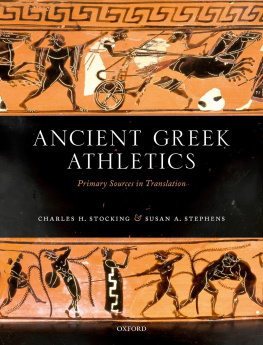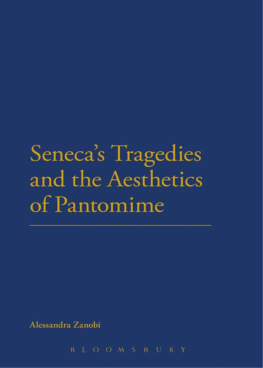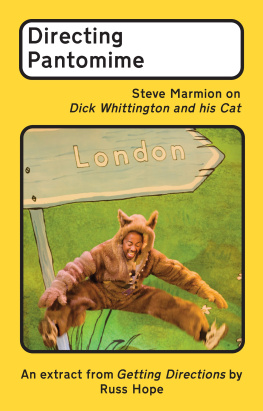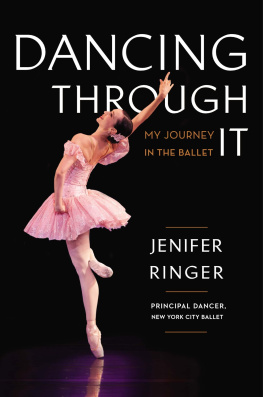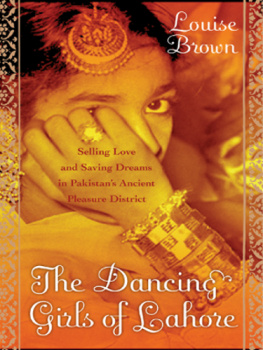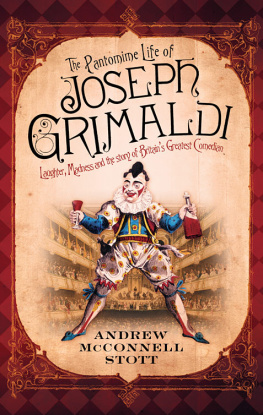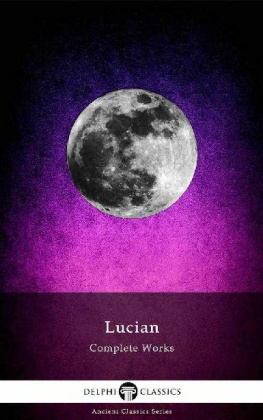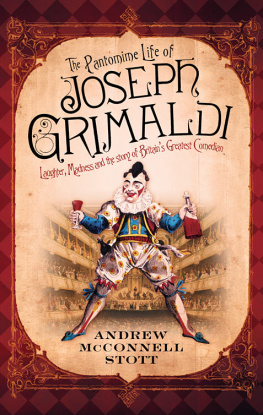Silent Eloquence
Classical Literature and Society
Series Editors: Michael Gunningham & David Taylor
Culture and Philosophy in the Age of Plotinus
Mark Edwards
Homer: The Resonance of Epic
Barbara Graziosi & Johannes Haubold
Ovid and His Love Poetry
Rebecca Armstrong
Pastoral Inscriptions: Reading and Writing Virgils Eclogues
Brian Breed
Silent Eloquence: Lucian and Pantomime Dancing
Ismene Lada-Richards
Thucydides and the Shaping of History
Emily Greenwood
CLASSICAL LITERATURE AND SOCIETY
Silent Eloquence
Lucian and Pantomime Dancing
Ismene Lada-Richards

Bloomsbury Academic
An imprint of Bloomsbury Publishing Plc
50 Bedford Square | 1385 Broadway |
London | New York |
WC1B 3DP | NY 10018 |
UK | USA |
www.bloomsbury.com
First published in 2007 by Gerald Duckworth & Co. Ltd.
Published in 2012 by Bristol Classical Press,
an imprint of Bloomsbury Publishing Plc.
Ismene Lada-Richards 2007
Ismene Lada-Richards has asserted her right under the Copyright,
Designs and Patents Act, 1988, to be identified as
Author of this work.
All rights reserved. No part of this publication may be reproduced
or transmitted in any form or by any means, electronic or
mechanical, including photocopying, recording, or any
information storage or retrieval system, without prior
permission in writing from the publishers.
No responsibility for loss caused to any individual or organization acting on
or refraining from action as a result of the material in this publication
can be accepted by Bloomsbury or the author.
British Library Cataloguing-in-Publication Data
A catalogue record for this book is available from the British Library.
eISBN-13: 978-1-4725-3770-6
Library of Congress Cataloging-in-Publication Data
A catalog record for this book is available from the Library of Congress.
Typeset by Ray Davis
Contents
For Juliette
Editors Foreword
The aim of this series is to consider Greek and Roman literature primarily in relation to genre and theme. Its authors hope to break new ground in doing so but with no intention of dismissing current interpretation where this is sound; they will be more concerned to engage closely with text, subtext and context. The series therefore adopts a homologous approach in looking at classical writers, one of whose major achievements was the fashioning of distinct modes of thought and utterance in poetry and prose. This led them to create a number of literary genres evolving their own particular forms, conventions and rules genres which live on today in contemporary culture.
Although studied within a literary tradition, these writers are also considered within their social and historical context, and the themes they explore are often both highly specific to that context and yet universal and everlasting. The ideas they conceive and formulate and the issues they debate find expression in a particular language, Latin or Greek, and belong to their particular era in the classical past. But they are also fully translatable into a form that is accessible as well as intelligible to those living in later centuries, in their own vernacular. Hence all quoted passages are rendered into clear, modern English.
These are books, then, which are equally for readers with or without knowledge of the Greek and Latin languages and with or without an acquaintance with the civilization of the ancient world. They have plenty to offer the classical scholar, and are ideally suited to students reading for a degree in classical subjects. Yet they will interest too those studying European and contemporary literature, history and culture who wish to discover the roots and springs of our classical inheritance.
We wish to express our especial indebtedness and thanks to Pat Easter-ling, who has from the start (1999) been a constant source of advice and encouragement without which the series would probably never have got going at all. From Cambridge too there is Robin Osborne who, if ever we were at a loss to think of an author for a particular topic, almost always came up with a suitable name or two and was never stinting of his time or opinion. More recently, we have been lucky too to receive much advice and assistance, chiefly with regard to Latin scholars in the United States, from Tony Woodman, now at Virginia. And we cannot fail to mention one person whose help and criticism has been throughout invaluable and that is the late John W. Roberts, editor of the recently published Oxford Dictionary of the Classical World. We owe him no small debt of gratitude. Finally, we should like to thank Deborah Blake, Duckworths Editorial Director, for her continued support and enthusiasm.
Michael Gunningham
David Taylor
Acknowledgements
The seeds of this book lie in my article A Worthless Feminine Thing? Lucian and the Optic Intoxication of Pantomime Dancing, published in Helios (Lada-Richards, 2003a). Material originally included in that article has been reworked in parts of , but the reader familiar with the article piece will recognise the echo of its arguments at several junctures in Silent Eloquence. Many thanks to the Editor of Helios, Professor Steven Oberhelman, for his kind permission to re-use material in this way.
Richard Hunter and Edith Hall have given the project wholehearted support from its inception, while Jas Elsner has offered shrewd comments on some of my pantomime-related writings and much needed encouragement at a critical time. I could not be more grateful to them. My greatest debt is to Pat Easterling, who, as always, could not have been more generous with her time, encouragement, enthusiasm, ideas, and so much more. I can only hope that this volume goes some way towards repaying her intellectual investment in the story of ancient pantomime; for her friendship and personal interest in my affairs no repayment will ever be even remotely adequate.
Completion of this book was made possible by financial support provided by the AHRC in the form of a Research Leave Award, for which I am profoundly grateful.
It is also a pleasure to thank Michael Gunningham, who first approached me on behalf of Duckworth and enthusiastically supported a proposal on pantomime dancing, even though the book he was initially after was one on Aristophanes! David Taylors cheerful editing rescued me from many a blunder and Deborah Blake saw the book to the press with exemplary skill and patience: heartfelt thanks to both.
For debts of a personal kind, I can never thank enough my husband David, for his loving support of my totally non-scientific interests, and especially Mary Richards, without whose generous help with childcare and much else the project would have taken considerably longer in the making. Finally, this book is dedicated, with love, to our little Juliette, already talented prima ballerina. May she always love to dance!
Abbreviations
AJA = American Journal of Archaeology
AJP = American Journal of Philology
ANRW = Aufstieg und Niedergang der rmischen Welt
Next page

